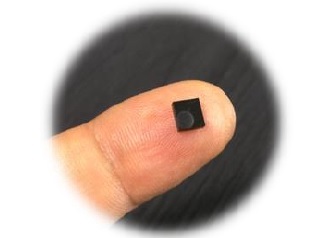The startup company EYL, whose CEO is Jeong Bu-seok, announced Wednesday that it will begin supplying its independently developed quantum random number security system (TriGen) to a client company by the end of the month. The client company is known to be a large-scale domestic manufacturer.
Rather than general random numbers, for which there is a regular pattern, EYL’s security system uses a natural phenomenon to generate quantum random numbers that are impossible to predict or control through security keys or passwords, thereby maximizing the security of the passwords generated by the system. Applying the uncertainty principle, the primary principle of quantum mechanics, the system uses the pulses produced by naturally decaying radioisotopes attached to a microchip to carry out encryption.
 |
A chip developed by EYL which generates quantum random numbers |
Director of Planning Paik Jeong-hyun said, “Our development of a quantum random number generator that can be embedded into a microchip has set us apart from other companies in our field. Our incredible technological capability, which even global companies have difficulty matching, and multiple patents have had a significant impact on the global security market.”
Earlier this month, EYL was named as the “Diamond Winner” of the MassChallenge 2016, a prestigious startup accelerator program based in Boston, where the company competed with over 2,500 other startups. This is an indication of the widespread recognition of its technological prowess and commercial value. Paik said, “We are currently being inundated with requests from Silicon Valley investors to take part in cooperative investment endeavors.”
EYL’s quantum random number generation system consists of a USB/server embedded with a quantum random number generator chip and a mobile application. The password created by plugging the USB into a computer is then entered into and executed via the mobile application, and the entire process is monitored by the server in real time to prevent invasion by outside actors or other security breaches.
The quantum random number generator chip currently being developed and produced is approximately 5 millimeters wide. However, once a chip smaller than 2 millimeters is developed, it is expected that the technology will be applied to mobile phones and other electronic devices. Currently engaged in negotiations with a telecommunications company over an Internet of Things-related joint project, EYL is receiving support from the Gyeonggi Center for Creative Economy & Innovation and other institutions in relation to its expansion into foreign markets.
(
jshwang@heraldcorp.com)








